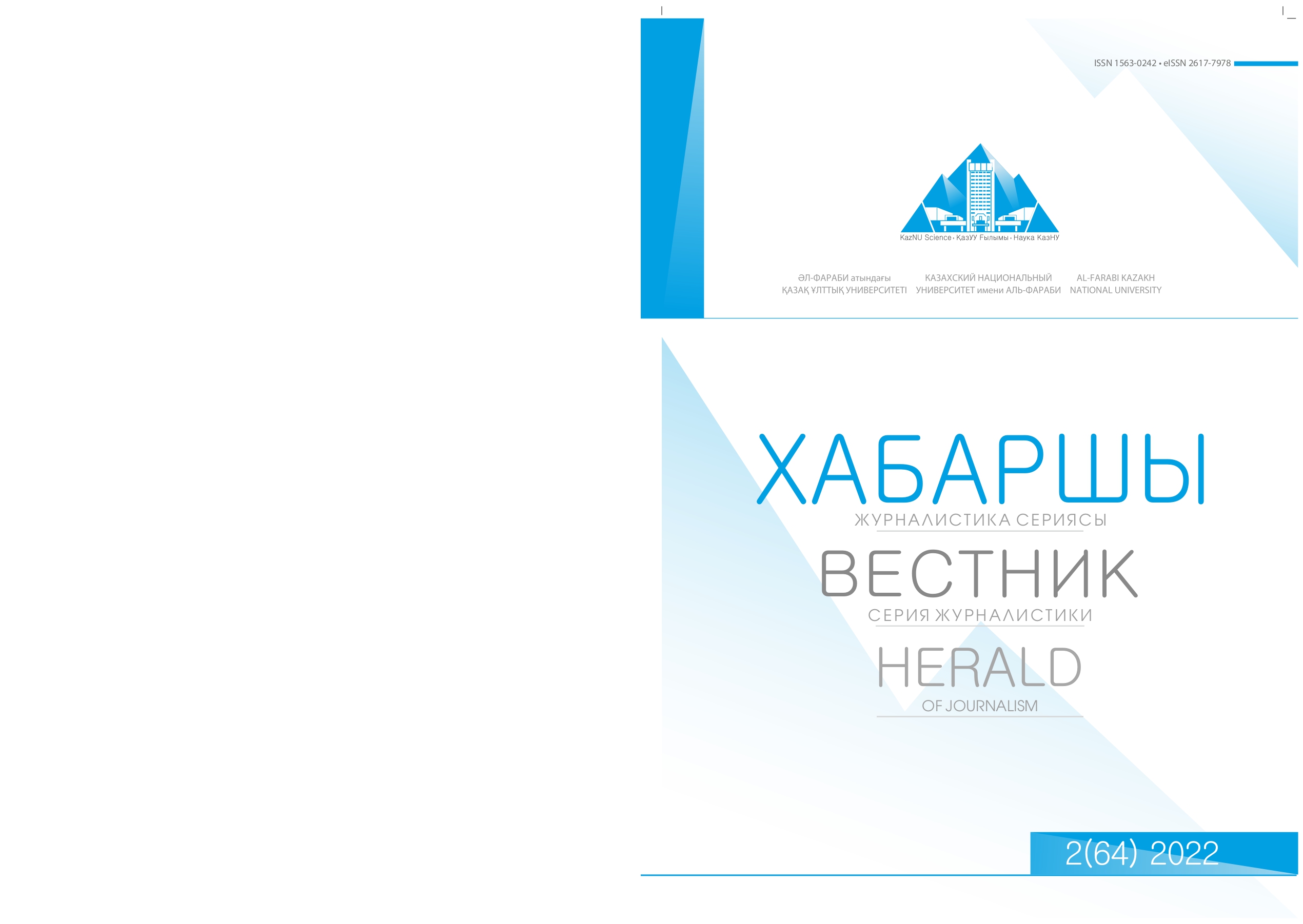Ethical dilemmas of kazakhstani journalists
DOI:
https://doi.org/10.26577/HJ.2022.v64.i2.04Abstract
A journalist is supposed to provide society with true, objective, balanced, up-to-date information and act fairly and impartially, be truthful and transparent. Otherwise, journalists may cause harm by failing to act ethically. The purpose of this research is to examine journalism ethics in Kazakhstan, explain probable reasons for ethical misbehavior and suggest possible solutions to the existing problems in journalistic ethics. It is an important study because journalism misbehavior affects everyone and little attention is given in research about journalism ethics in Kazakhstan. To address research inquiry, this research study uses qualitative structured interviews with 11 working journalists and editors in the country. The interviews were conducted in Russian language during the fall 2021. Convenience and snowball sampling were used in the study. Specifically, seven journalists working in independent media outlets, three journalists from state-owned media outlets and one journalist working in international media outlet, participated in the study. The sample consisted of five women and six men, ranging in age from 29 to 49 years old and having experience in journalism from seven to 25 years. The interviewees did not receive a monetary compensation for participation. The findings suggest that socio-economic, political and personal factors explain ethical misbehavior in journalism. As for probable solutions to the current problems in journalistic ethics, the majority of the respondents believe that the situation may be improved through teaching ethics in universities, holding training and professional workshops for everyone involved in journalism. Some journalists suggest that nothing needs to be done with ethics and instead it is necessary to solve some complex issues in society. The value of the conducted research lies in the study of the reasons for ethical misbehavior.
Keywords: journalistic ethics, Kazakhstan, journalism, ethical principles, deontology.
References
Bucholtz, I. (2020). “It has to be in one’s head and heart”: the understanding of journalism ethics in Latvian media. Journalism Studies, 21(3), 370-387.
Demers, F. (1989). Journalistic ethics: the rise of the “good employee`s model”: a threat for professionalism? Canadian Journal of Communication, 14(2), 15-27.
Grynko, A. (2012). Ukrainian journalists' perceptions of unethical practices: Codes and everyday ethics. Central European Journal of Communication, 5(2), 259-274.
Inform.kz. (2012). Кодекс этики журналиста Республики Казахстан - полный текст. [Code of ethics of a journalist of Kazakhstan - full text]. Retrieved from: https://www.inform.kz/ru/kodeks-etiki-zhurnalista-respubliki-kazahstan-polnyy-tekst_a2506438.
Klyueva, A. & Tsetsura K. (2015). Economic foundations of morality: Questions of transparency and ethics in Russian journalism. Central European Journal of Communication, 8(1), 21-36.
Kurambayev, B. (2017). Bribery and extortion in Kyrgyz journalism or simply profitable profession? Asia Pacific Media Educator, 27(1), 170-185.
Kurambayev, B. & Freedman, E. (2019). Ethics and journalism in Central Asia: A comparative study of Kazakhstan, Kyrgyzstan, Tajikistan and Uzbekistan. Journal of Media Ethics, 35(1), 31-44.
Lauk, E. (2008). Freedom for the media? Issues of journalism ethics in Estonia. Information Sciences, 47, 59-65.
Lo V., Man Chan J. & Pan Z. (2005). Ethical attitudes and perceived practice: A comparative study of journalists in China, Hong Kong and Taiwan. Asian Journal of Communication, 15(2), 154-172.
Mould, D. & Schuster, E. (1999). Central Asia: Ethics - a Western luxury. Ethics in journalism: A reader on their perception in the Third World. Bonn: Fridrich-Ebert-Stiftung.
Onyebadi, U. & Alajmi F. (2016). Gift solicitation and acceptance in journalism practice: An assessment of Kuwaiti journalists’ perspective. Journalism, 17(3), 348-365.
Quinn, F. (2018). Failing to prepare? Journalism ethics education in the developing world: The case of Cambodia. Journal of Media Ethics, 33(2), 50-65.
Ramaprasad, J., Hanitzsch, T., Lauk, E., Harro-Loit, H., Hovden, J. F., Väliverronen, J., & Craft, S. (2019). Ethical considerations: Journalists’ perceptions of professional practice. Worlds of Journalism: Journalistic Cultures Around the Globe, (199-231). New York: Columbia University Press.
Rao, S. (2018). Awakening the dragon’s and elephant’s media: Comparative analysis of India’s and China’s journalism ethics. Journalism, 19(9-10), 1275-1290.
Steele, J. (2013). “Trial by the press”: an examination of journalism, ethics, and Islam in Indonesia and Malaysia. The International Journal of Press/Politics, 18(3), 342-359.
Tsetsura, K. (2015). Guanxi, gift-giving, or bribery? Ethical considerations of paid news in China. Public Relations Journal, 9(2). 1-26.
Wu, H. D. & Lambert, C. A. (2016). Impediments to journalistic ethics: how Taiwan`s media market obstructs news professional practice. Journal of Media Ethics, 31(1), 35-50.
Xu, D. (2016). Red-envelope cash: journalists on the take in contemporary China. Journal of Media Ethics, 31(4), 231-244.













